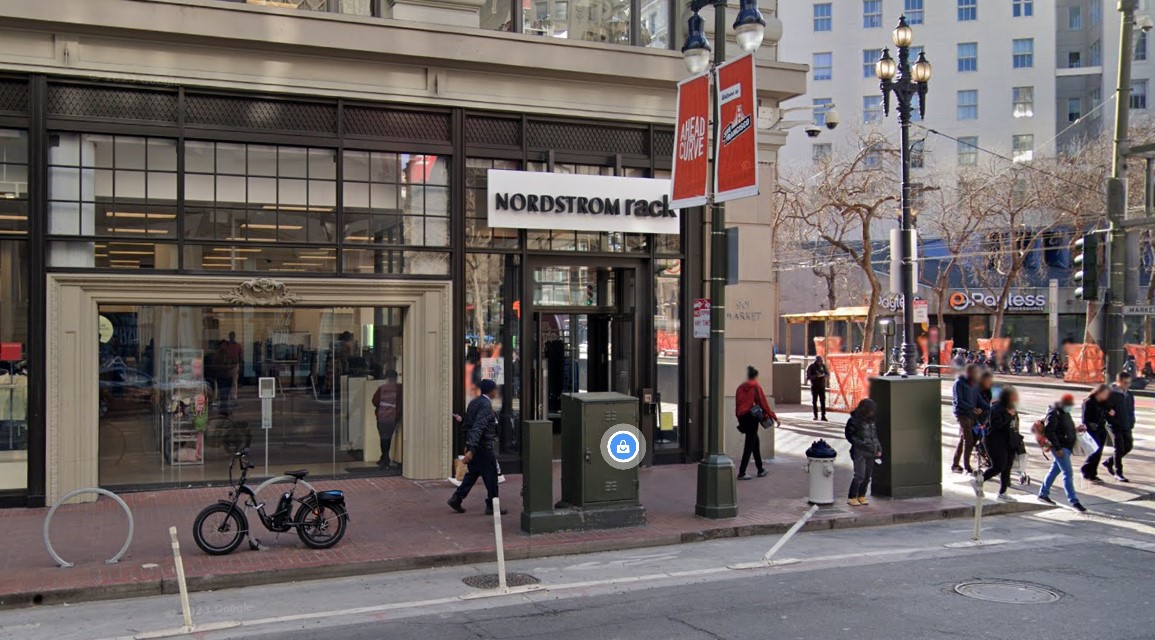‘There to Save a Life’: San Francisco Bars Combat Fentanyl Overdoses With Narcan
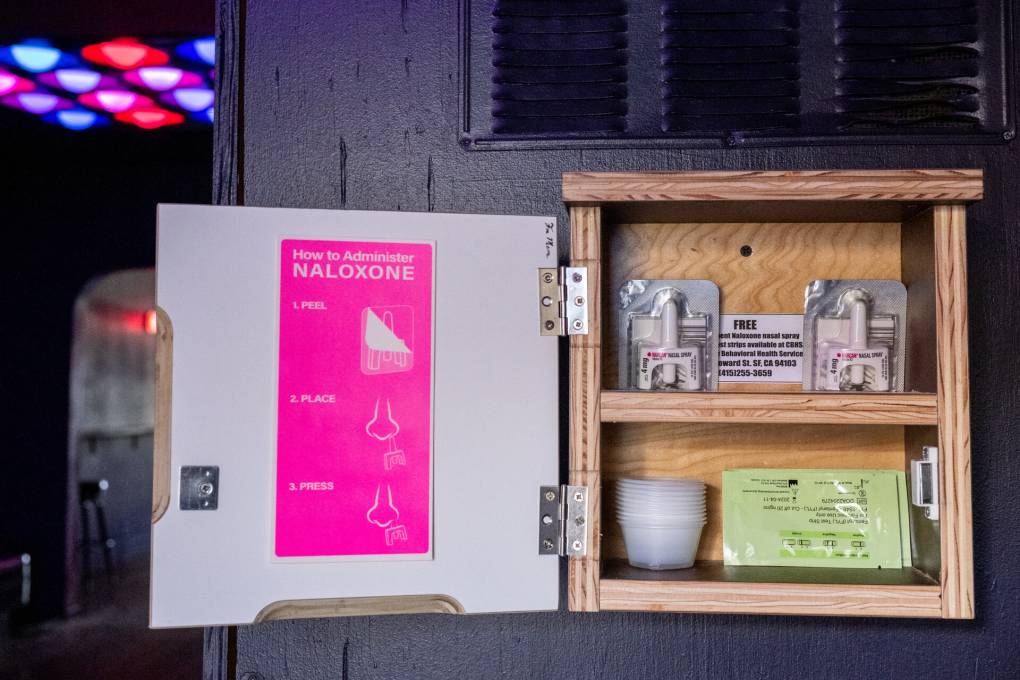
Tika Hall was at a music show in San Francisco’s Mission District in February when around 10 p.m. someone shouted, “Anybody got narcan?”
Hall, who is an artist, musician, and longtime San Francisco resident, understood that this meant someone had overdosed and that their survival might depend on finding Narcan, a naloxone nasal spray that reverses opioid overdoses.
Hall and a friend ran to the nearest bar, one of the few places still open that might carry it.
“When I go into crisis mode, I get a lizard brain, and I was like, ‘What we have to do is get this thing,'” Hall said.
When the first bar didn’t have Narcan, they tried the next one, The Eagle, which did. The bartender gave them the medicine without asking, and the narcan was used to revive the person who overdosed.
On April 11, 2023, a damage reduction box designed by Josh Yule hangs on the wall at the Mothership Bar in San Francisco. (Beth LaBerge/KQED)
“If that happened somewhere where there wasn’t a bar selling Narcan nearby, or if that happened during the day when a bar wasn’t open, I don’t know what would have happened,” Hall said.
Now Hall carries Narcan with him everywhere, and the incident underscores the importance of making the antidote available to the public in places like bars. Two hundred people fatally overdosed in San Francisco in the first three months of this year (PDF), and nationwide there has been a steep rise in accidental overdoses as other illicit drugs — such as cocaine and methamphetamines — have been increasingly laced with fentanyl.
Bay Area bar owners, employees and advocates are taking the initiative to ensure the safety of guests and the community. The nonprofit FentCheck brings Narcan and fentanyl test strips to bars and other common areas, and bars stock the life-saving drugs and host administration training sessions. Those campaigning for nightlife harm reduction say the effort has also opened a needed conversation about the risks and realities of drug use.
Harm reduction boxes provide ‘a beacon for conversation’
This drive to reduce stigma and save lives is why Josh Yule has been building harm reduction boxes and has been shipping them to bars since December. The light, medicinal-white boxes contain Narcan; a neon pink three-step administration guide; and fentanyl test strips.
Yule, a former bartender at The Knockout who still books shows there, makes the boxes at a friend’s wood shop in San Leandro. To date, nine San Francisco facilities are hosting the boxes, including The Knockout, The Phone Booth, The Make Out Room and Mothership.
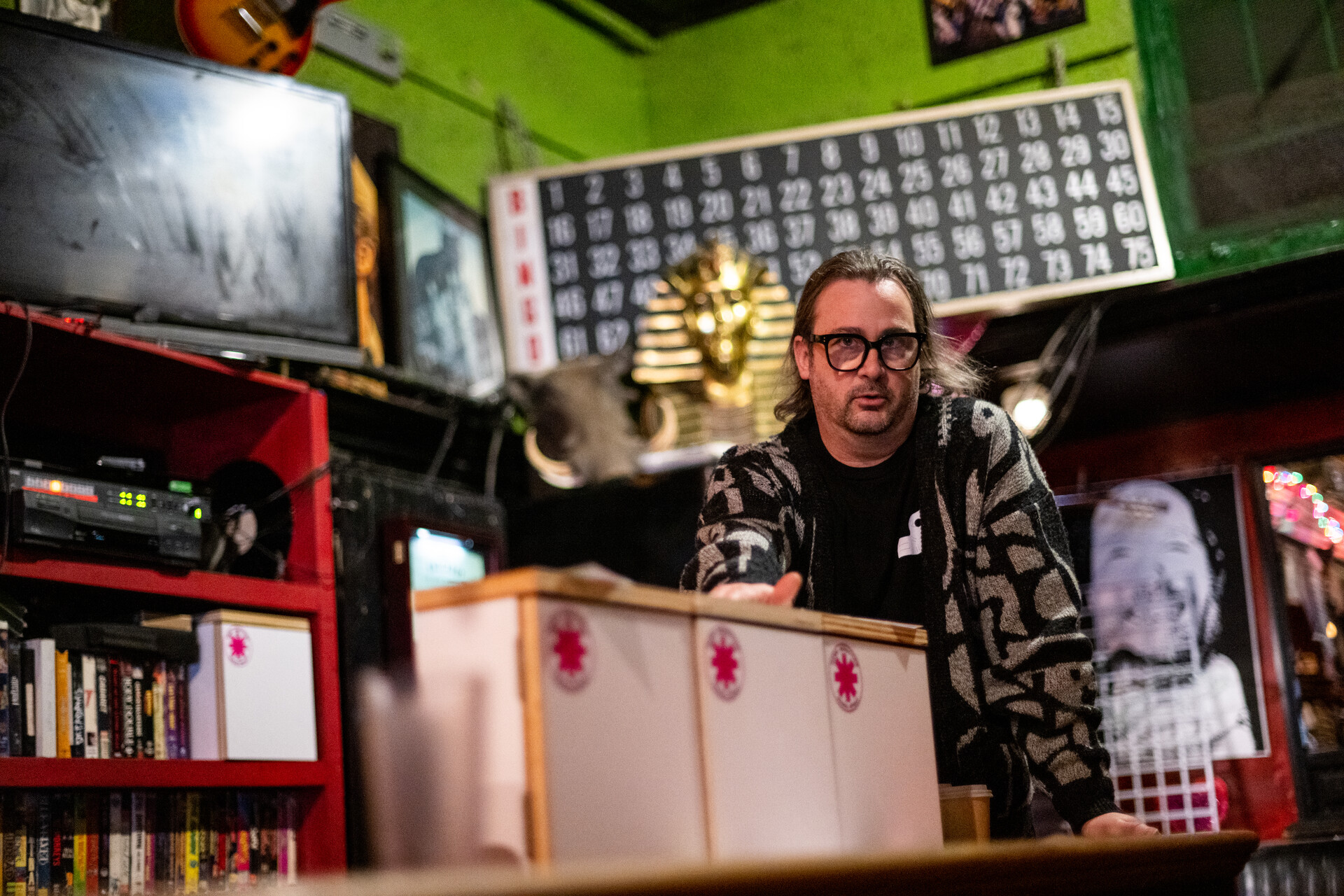 Josh Yule shows a group of bar employees gathered for a Narcan training session the harm reduction boxes he plans to distribute to other bars in the Bay Area on December 15, 2022 at The Knockout in San Francisco. (Beth LaBerge/KQED)
Josh Yule shows a group of bar employees gathered for a Narcan training session the harm reduction boxes he plans to distribute to other bars in the Bay Area on December 15, 2022 at The Knockout in San Francisco. (Beth LaBerge/KQED)
Each box is dedicated to Yule’s mother, Roberta Damron, who fatally overdosed on fentanyl in 2021. He signs the inside doors of the boxes “For Mom”.
“It’s there to save lives. First and foremost, it does,” Yule said. “But it’s also there so people can talk to each other. People can feel safe knowing it’s there.”
Yule said his mother’s death at the age of 66 came as a shock. His mother was religious, straight forward and hilarious.
“She was great,” Yule said.
He recalled how, when he was in middle school, his mother tore down a poster in his room of Sid Vicious, the Sex Pistols bassist who died of a drug overdose.
“She would be really embarrassed that she died like that. I just know that. And I think about it a lot,” Yule said. “I never really understood what was going on. Maybe I didn’t really want to understand. I’ll find out.”
Yule had studied graphic design at the California College of the Arts when he decided to put his energies into work focused on destigmatizing opioid use disorders.
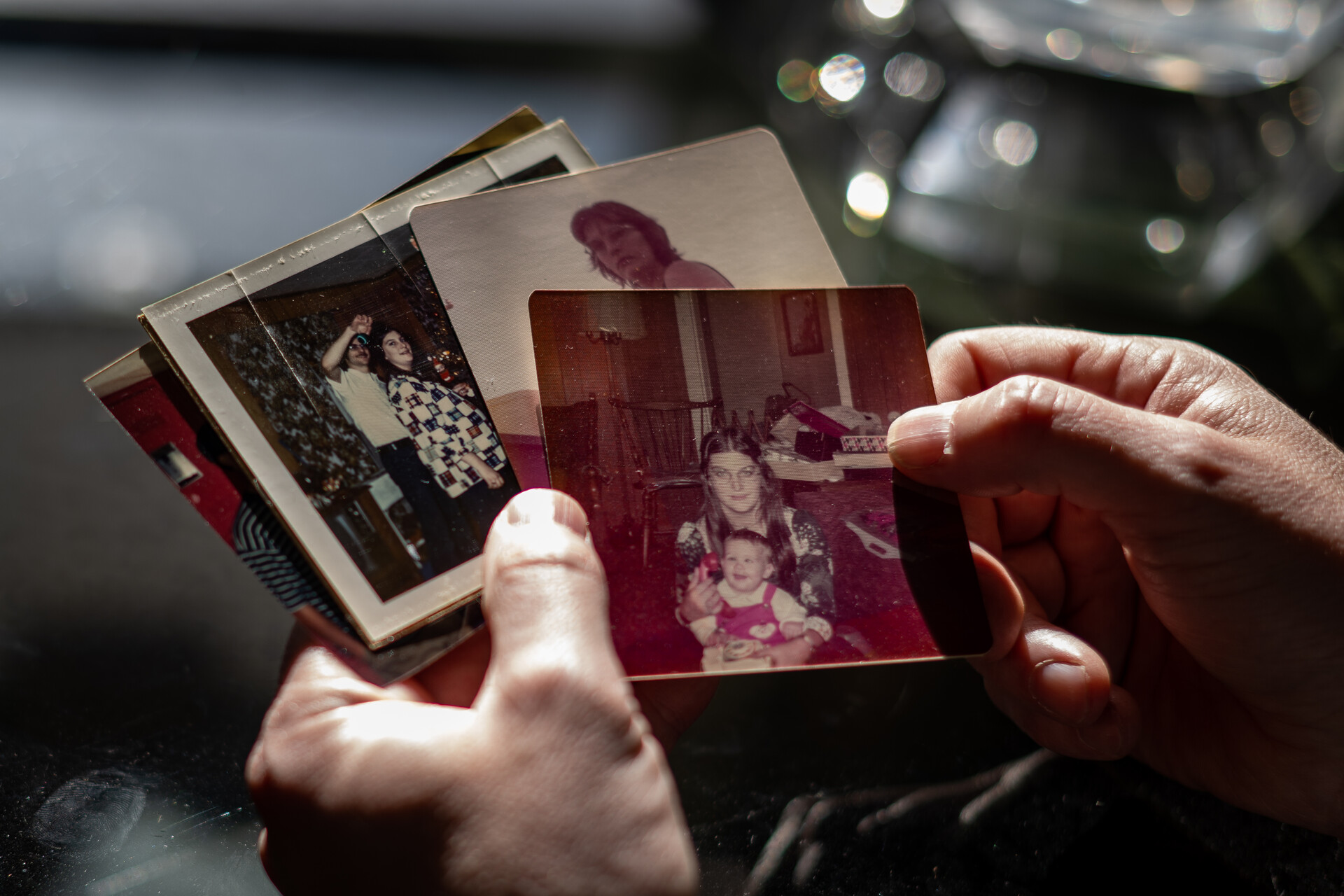 Josh Yule looks at the few photos he has of his mother at his home in San Francisco on April 21, 2023. (Beth LaBerge/KQED)
Josh Yule looks at the few photos he has of his mother at his home in San Francisco on April 21, 2023. (Beth LaBerge/KQED)
He designed posters and stickers, but also wanted to create something physical that could become a “beacon of conversation.” The harm reduction boxes became his thesis project.
Before his mother’s death, Yule had also lost two friends to fatal overdoses.
“We should destigmatize this disorder. It’s the only way to get anywhere. We’re just taking baby steps,” Yule said. “I wish there was something that would entice me to talk to my friend or something that I would have seen. Maybe he would still be there. Maybe I would have put two and two together with my mother.”
Bar staff train and prepare for emergencies
Then, last winter, bar staff and parishioners were urged into action after a string of near-fatal overdoses at bars in the Mission District. Anita Ellis, a bartender at The Phone Booth and Pop’s Bar, organized a training session for all interested bartenders to learn more about Narcan and fentanyl test strips.
At least 50 people turned out for The Knockout’s December practice, many more than a similar practice Ellis had organized years earlier.
“I felt a lot of community spirit, that ‘let’s take care of each other’ feeling,” Ellis said. “The idea of someone losing their life because they want to take a little smack in the bathroom because it’s their birthday or whatever or no occasion at all, that’s ridiculous to me. That should not happen.”
 A group of bar employees listen to Josh Yule talk about the harm reduction boxes he has created during a Narcan training session at The Knockout in San Francisco on December 15, 2022. (Beth LaBerge/KQED)
A group of bar employees listen to Josh Yule talk about the harm reduction boxes he has created during a Narcan training session at The Knockout in San Francisco on December 15, 2022. (Beth LaBerge/KQED)
Yule spoke about the harm reduction boxes during the event, and about 20 people signed up for it. He’s still working through that list, and more people have signed up since then. He also wants to expand into restaurants and hopes to gain enough traction for the city or state to take over to continue the effort.
Joanna Lioce, Human Resources Manager at Vesuvio Cafe in North Beach, picked up one of the harm reduction boxes during this training session. Years ago, in response to overdoses in the alley outside the bar, Vesuvio employees were trained to administer Narcan. Lioce was able to undo an overdose in the alley with Narcan.
“It’s like anything — if you see someone fall into a pool and you can get out and save them, you will,” Lioce said.
She says Narcan is essential for bars in the age of fentanyl, like carrying a fire extinguisher.
Yule’s boxes warn guests that Narcan is available in case of emergencies.
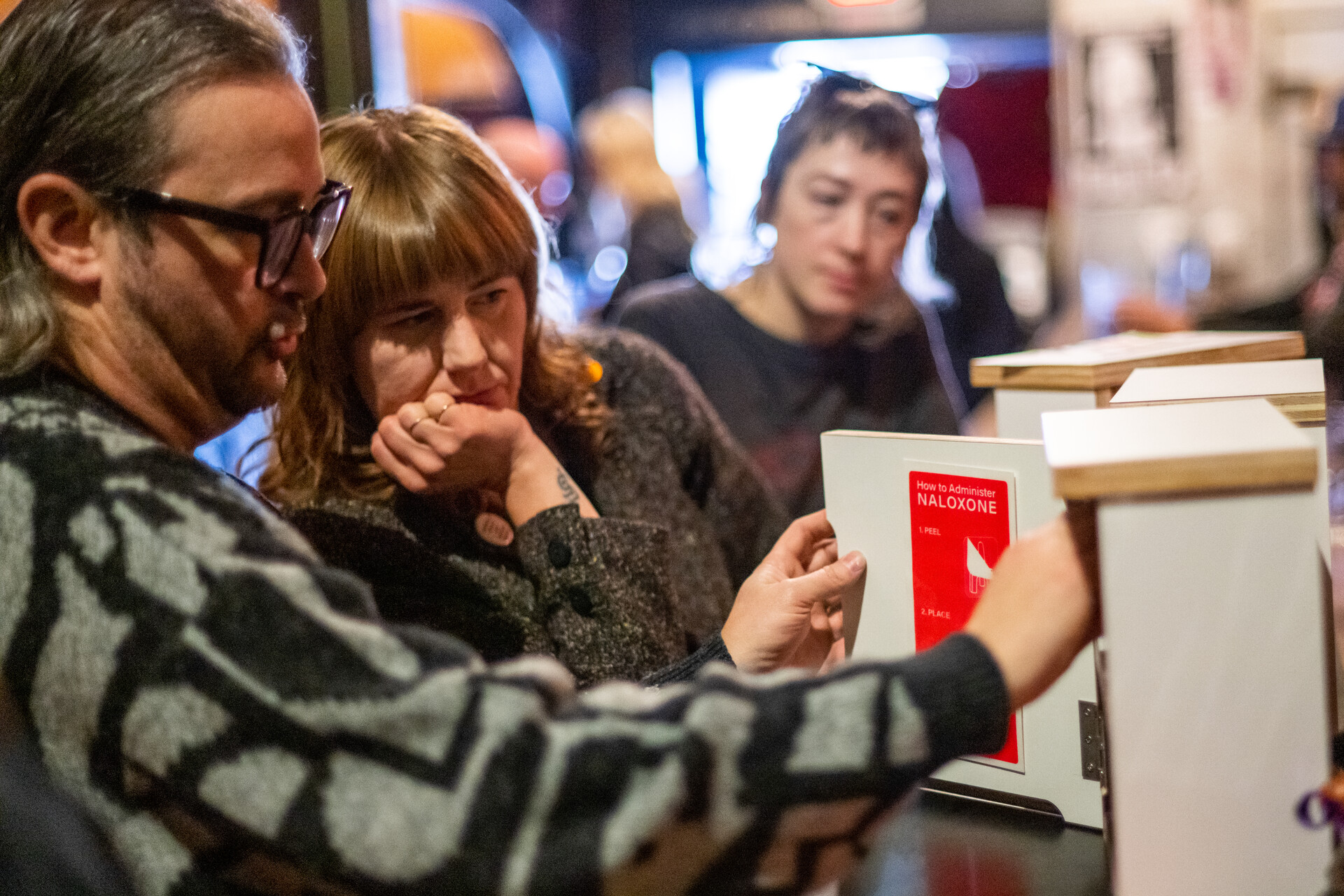 Josh Yule shows local bar employee Joanna Lioce a harm reduction box he developed to prevent fentanyl overdoses after a Narcan training session at The Knockout in San Francisco December 15, 2022. (Beth LaBerge/KQED)
Josh Yule shows local bar employee Joanna Lioce a harm reduction box he developed to prevent fentanyl overdoses after a Narcan training session at The Knockout in San Francisco December 15, 2022. (Beth LaBerge/KQED)
“We all kind of sound like grannies now. At least my friends and I say, ‘In my day you could buy cocaine in the Tenderloin and you didn’t even have to bother with it.’ Now it’s like, ‘No, you can’t do that,'” Lioce said.
But there are still barriers to accessing Narcan for free, and Yule said one of the biggest challenges in completing his project was figuring out where to get Narcan. Now he goes to the city’s Community Behavioral Health Services pharmacy where the public can get Narcan for free.
A potential political solution and supply barriers
A bill by Member of Parliament Matt Haney, Assembly Bill 24, could require libraries, gas stations, residential hotels and bars in areas hit hardest by drug overdoses to carry Narcan or face a $100 fine.
“There is enough Narcan to put in all of these facilities and also to get into the hands of organizations that work directly with people who use drugs. They really need to be in both places,” Haney said in an interview. “And we must stop doing this if we are going to save lives.”




